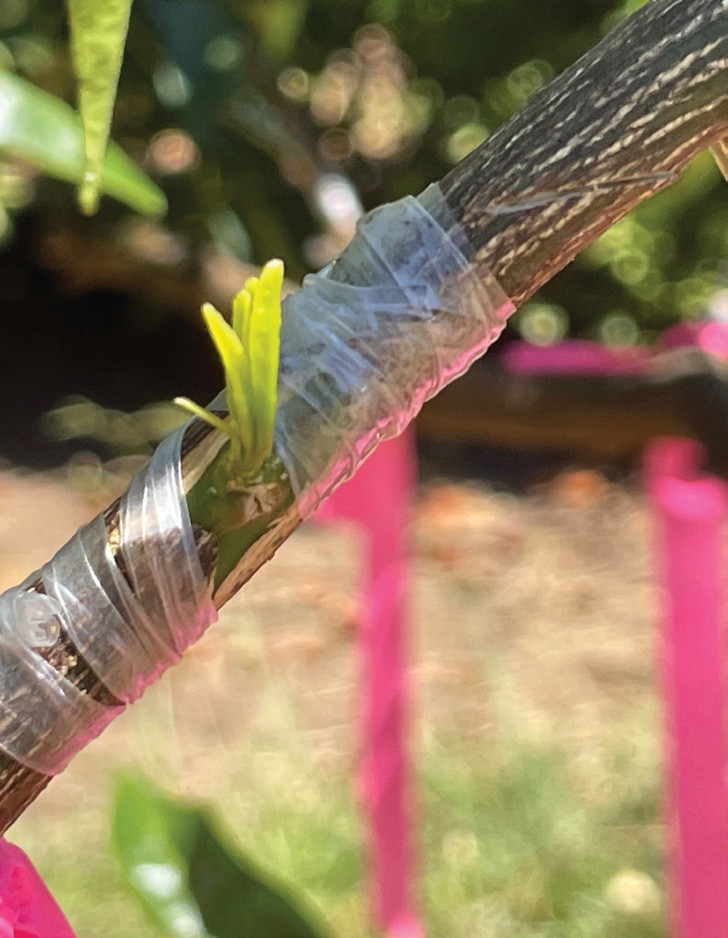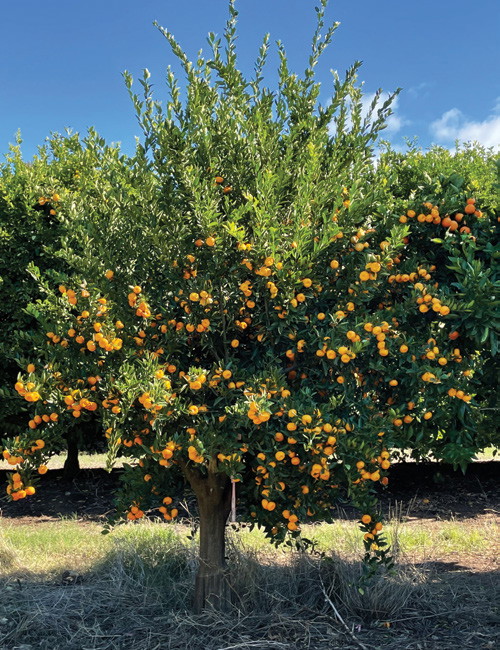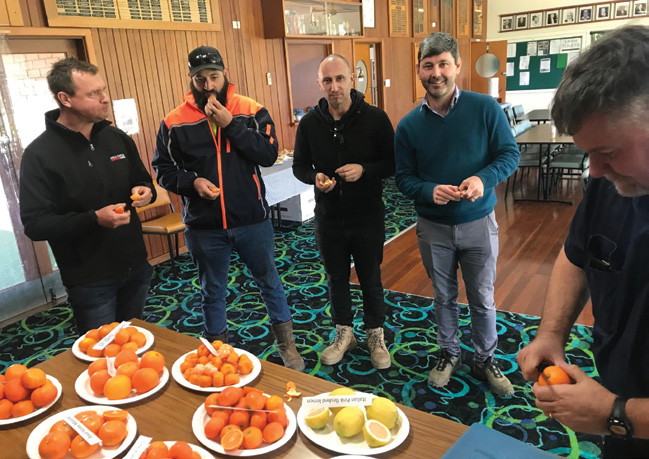
WA citrus
variety
update

NEW bud emerging on a reworked branch (left) and 3-year-old reworked Kishu mandarin tree (above).
To showcase the work in evaluating citrus varieties, Dr Dave Monks, from the New South Wales Department of Primary Industries, visited WA during early July.
Dave gave a presentation to growers on new varieties currently being evaluated. The talk focused on new seedless and low seeded mandarin varieties, mid to late season navel oranges and several new Valencia varieties. This was followed by a variety tasting session and a field walk at the Harvey evaluation site delivered by DPIRD senior technical officer Kevin Lacey, who manages the WA evaluation sites.
This is part of the Hort Innovation funded project Evaluation of new citrus varieties (CT17006), which is led by Dave. A component of the project involves evaluation of varieties at sites in Western Australia at Moora, West Gingin, and Harvey. The WA component is jointly managed by Kevin and collaborating local growers who manage the trees. Most of the evaluation in the project is carried out in NSW, based at the Dareton Primary Industries Institute.
The project taste provides the opportunity for growers to see and fruit.
The project aims to provide independent information on:
• Variety performance (yield, sugar/ acid/juice/colour, and the number of seeds)
• Faults (alternate bearing, poor cropping, poor size, splitting, poor peel-ability, and lack of colour development)
• Maturity time and length of harvest for different areas
• Variety suitability to local conditions
• Specific variety management requirements
• Novelty — new characteristics with market advantage (flesh colour, shape)
The project also provides the opportunity for growers to see and taste fruit at field and tasting days, which is crucial in assisting them to make informed decisions on how and if a new variety will fit into their orcharding business structure.
Since 2017, WA has imported 4 lemon, 5 grapefruit, 10 mandarin, 8 Valencia and 5 navel varieties for rapid independent evaluation.
All varieties are protected through Plant Breeders Rights or with evaluation agreements between property owners and variety managers.

HARVEY growers Richard Eckersley (left), Andrew Sorgiovanni, Andrew Pergoliti with NSW DPI project manager and researcher Dr David Monks and DPIRD senior technical officer Kevin Lacey (cutting fruit) tasting new citrus varieties at the citrus variety update in Harvey on the 6 July 2022.
For close to 2 decades DPIRD has evaluated new varieties as they become available. It is anticipated an upcoming extension of the project will allow for continued evaluation of new varieties in the future.
In WA, as it is in NSW, the process involves reworking existing mature trees on site with new varieties to facilitate faster tree growth, crop production and evaluation.
Material for budding is provided via Auscitrus which ensures that it is free of harmful viruses and diseases.
For close to 2 decades DPIRD has evaluated new varieties as they become available. It is anticipated an upcoming extension of the project will allow for continued evaluation of new varieties in the future.
MORE INFORMATION
Fact sheets and information on many new varieties evaluated through the project can be found at the NSW DPI website dpi.nsw.gov.au/agriculture/horticulture/citrus and the DPIRD website at agric.wa.gov.au/citrus/mandarins-andtangors-western-australia and agric. wa.gov.au/citrus/orange-varieties-westernaustralia
OTHER INFORMATION
Will you have a home for your future fruit (Australian Citrus News Winter 2020 p22–23) www.horticulture.com.au/globalassets/hort-innovation/resource-assets/ct17006- citrus-news-winter-2020.pdf
Contacts:
• Dr Dave Monks (NSW DPI) dave.monks@dpi.nsw.gov.au
• Kevin Lacey (DPIRD) kevin.lacey@dpird.wa.gov.au
